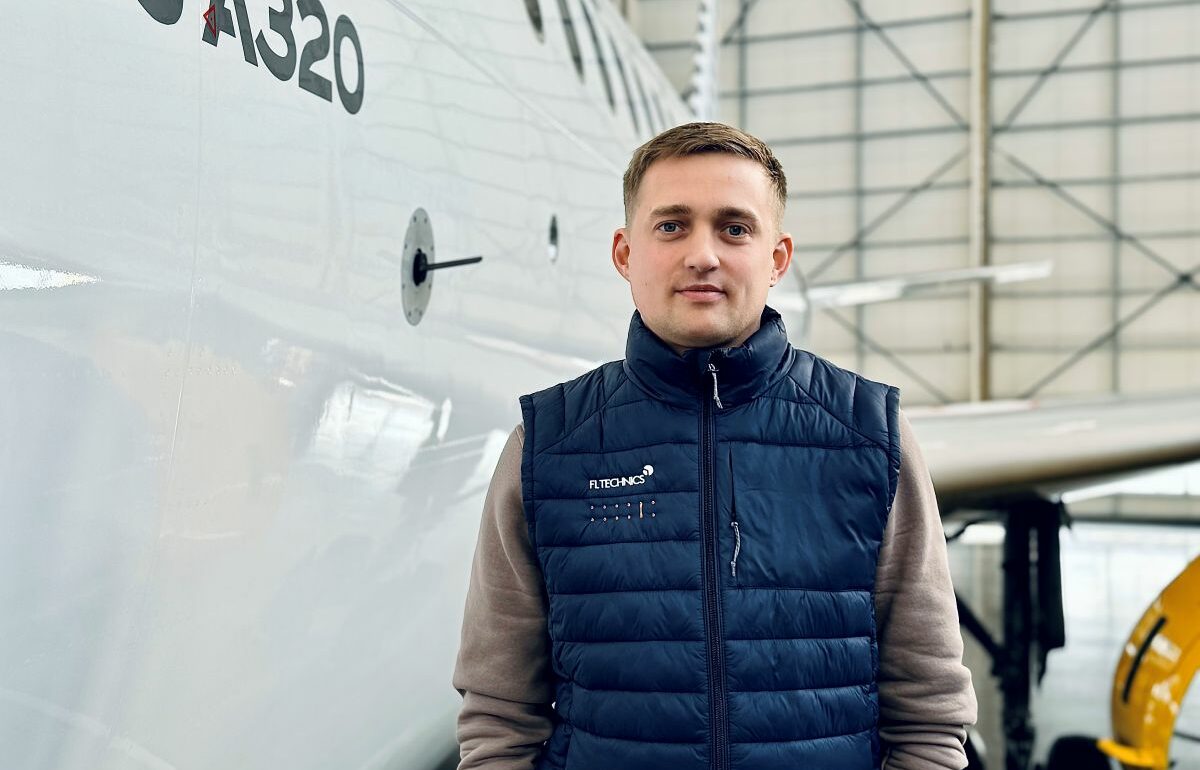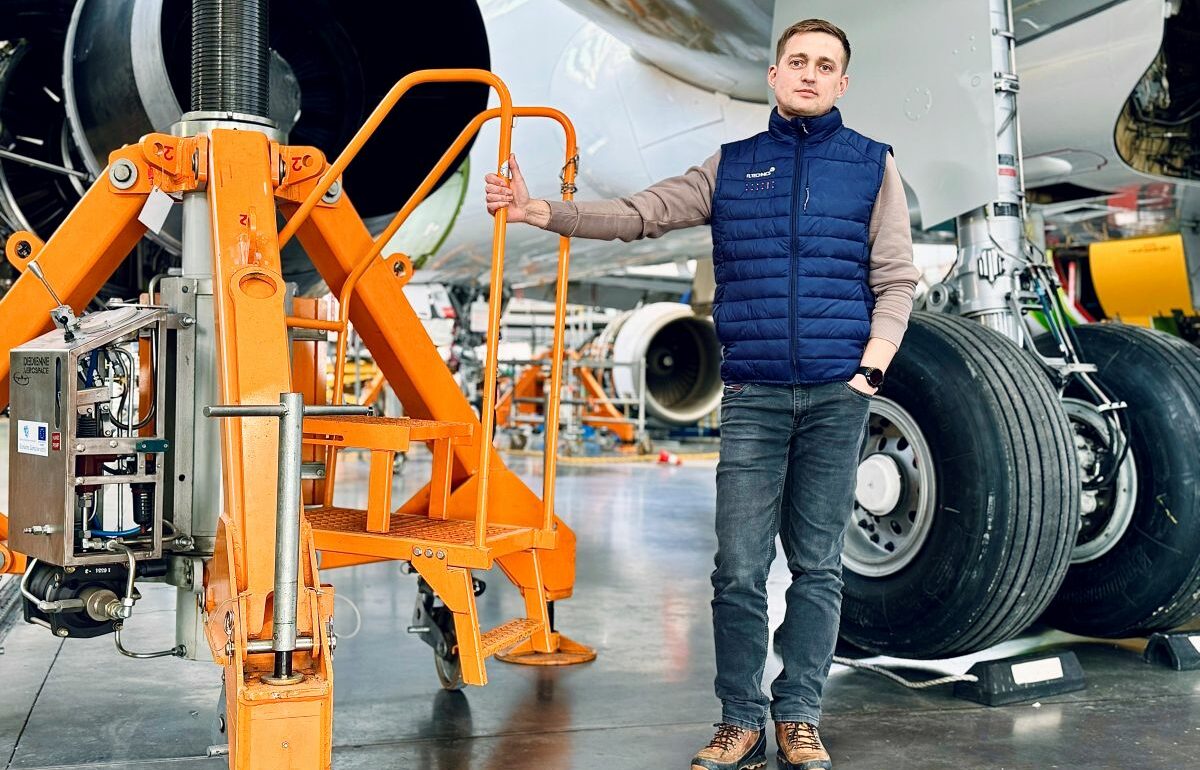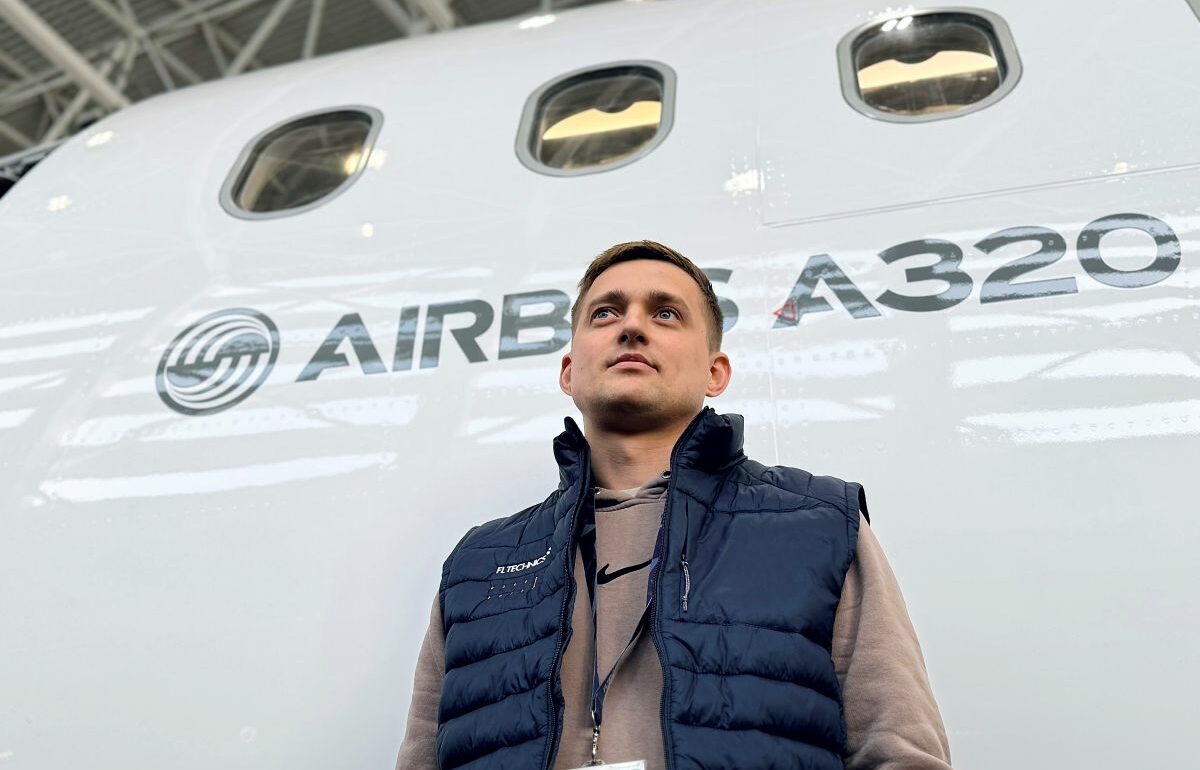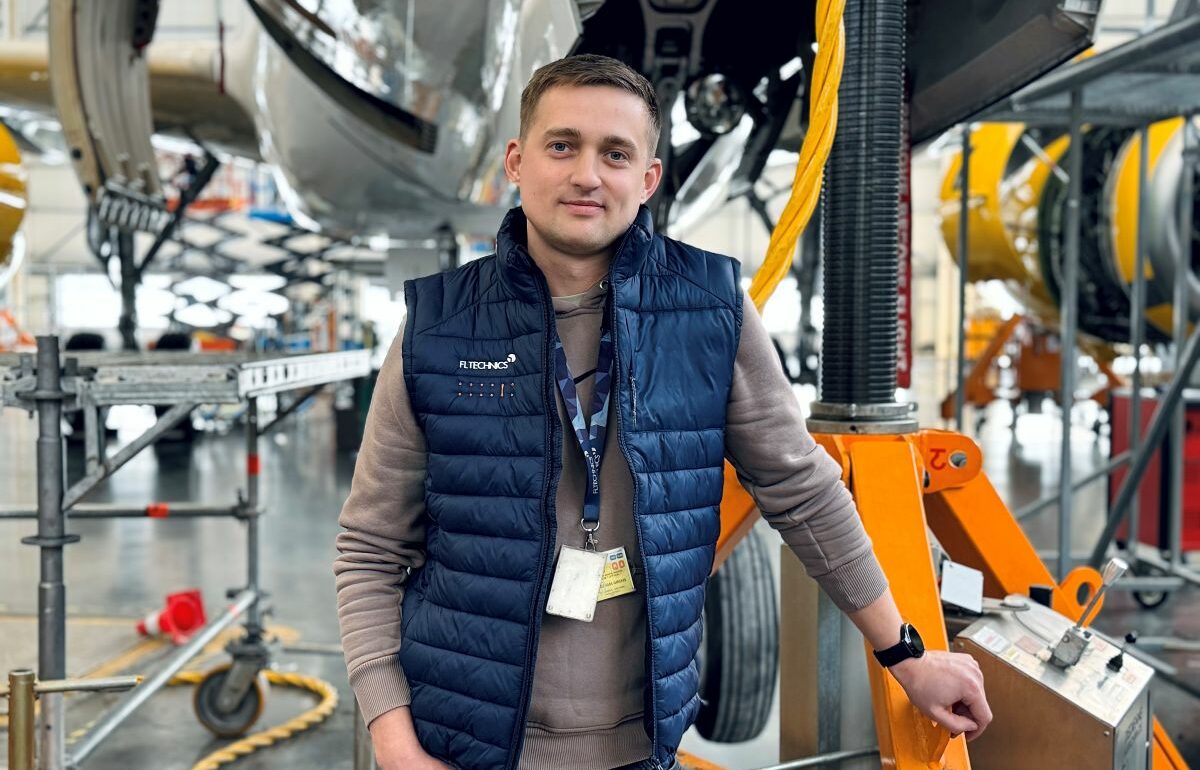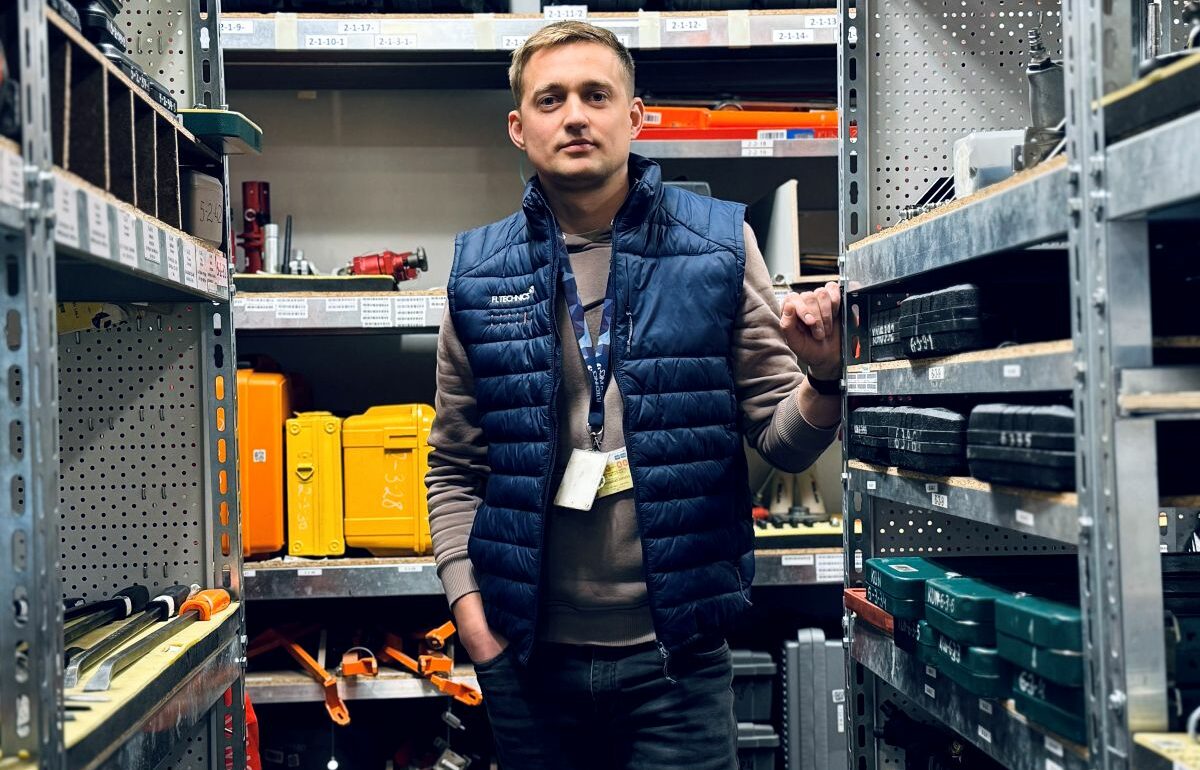What does it take to do work that few people ever see, but everyone depends on when they fly? That’s the daily reality for MRO (Maintenance, Repair, and Overhaul) specialists – the aircraft maintenance professionals who ensure planes safely take to the skies every day. One of the largest MRO providers is FL Technics, whose team of specialists offers a wide range of MRO services across bases in Europe, Asia and soon – Latin America.
Today we speak with FL Technics tooling engineer Mindaugas Girskis, whose career began 11 years ago when the Kaunas hangar was still empty – nothing inside but a team ready to build something from scratch. Mindaugas’s story reveals how responsibility, discipline, and a childhood fascination with planes transformed into a life’s calling.
You’ve been working at FL Technics for 11 years now. Can you tell us how your career at this organization began?
I started back in 2014, right when the company opened its hangar in Kaunas, Lithuania. At that time, I worked as a tool keeper. Later I became a senior tool keeper, and now I’m a tooling engineer. My entire career here has been a steady progression alongside the company’s growth. We built everything from scratch. What you see in the hangar today was created by our team’s own hands. I think we are lucky – we feel an incredibly strong connection both to this place and to the work itself.
Did you work in aviation before this?
No, but I grew up in Karmėlava – a small town where life has always revolved around the airport operating there. I remember as a kid, it wasn’t even fenced off – you could just walk right up and watch the planes. It was fascinating, though I never imagined I’d end up working in aviation myself. When I heard the company was hiring, I applied, but had to really prove myself to land the position I wanted. I had completed vocational school, but honestly, most of what I know I learned here. The company invests in training for all employees, which opens up real opportunities for career advancement.
Most passengers never see the maintenance side of aviation or the specialized tools involved. Can you tell us what tool engineers are responsible for?
Tool engineers handle metrological inspections and all the ground support equipment in the hangar. We’re also responsible for ordering new tools and materials, and conducting load tests.
The work itself is very dynamic – you need to constantly learn and stay on top of new developments. Aircraft maintenance organizations service multiple aircraft types, and depending on market conditions, we’re always acquiring new certifications that allow us to work on different aircraft models. Training – both theoretical and hands-on – is an essential part of the certification process. When we start working on a new aircraft type, we have to select, order, and assemble the right toolsets. It’s a huge responsibility because no matter how skilled our specialists are, without the right specialized tools, they simply can’t do their jobs.
How do you make sure everything gets done right?
Our hangar operates on LEAN – a system that the company has implemented and continuously develops. Clear processes and standards help us avoid mistakes and anticipate risks before they happen. Every step in aviation requires at least three signatures for approval. That’s how it works in my department too – each employee checks their own tools and procedures, then I review their work, and finally my supervisor reviews everything. By having multiple people verify each other’s checks, we make sure nothing slips through the cracks.
An aircraft consists of thousands of components that need constant inspection, adjustment, and maintenance. And that requires tools – not just any tools, but ones that meet the strictest safety and precision standards. What kinds of tools are used in aviation and how is their use managed?
We categorize tools into three groups: standard, ground support, and specialized. Standard tools are what a technician uses every day – wrenches, screwdrivers, plier sets, torque wrenches. These are stored in self-service cabinets that automatically log who took what and when. But even a simple screwdriver needs attention – not just to unscrew, but to screw with a specific force defined by the manufacturer.
Specialized tools are designed for specific aircraft models or even individual components. Think wing joint testing kits, radar calibration stands, aircraft electronics diagnostic equipment. Some are custom-manufactured when the company obtains maintenance licenses for new aircraft types. These tools are managed by dedicated personnel who track every checkout – they know who’s working with what tool and where it’s being used, and they monitor its condition. Every tool has a unique marking and designated location, so if one goes missing, it can be easily found. We even have photos of all the tools to be sure we know how each of them looks like.
Finally, there’s ground support equipment – the big guns. Lift platforms, jacks, air supply stations, power generators, pressure testing equipment. These systems are often computerized, and maintaining them is a science unto itself.
In aviation, there’s no room for “oh, this should do”. If a tool doesn’t work precisely, it can damage a component worth tens of thousands of euros. If a tool goes missing, the entire process stops until it’s found. And if a tool gets left inside an aircraft – that’s an incident nobody wants to experience.
That’s why at MRO organizations like FL Technics, tool engineers are like technology architects – we create systems that work with Swiss watch precision.
How do you think the aviation industry will change over the next 10 years?
As usual, new aircraft types from major manufacturers enter the market, and technologies gradually evolve. But change comes slowly in aviation. Aircraft control systems are very conservative – introducing any innovation requires lengthy testing and certification processes. Aviation is one of the safest forms of transportation in the world, and that’s been achieved through decades of strict regulation and cautious implementation of new technologies. For these reasons, I don’t think aviation will change dramatically over the next 10 years. However, it’s possible that in 30-50 years, hydrogen might power not just small aircraft but passenger planes as well. Even so, using hydrogen in commercial aviation will face technical, infrastructure, and safety challenges, so everything will depend on how those issues get resolved.
Artificial intelligence is already creating art, helping diagnose diseases, and beating even the best chess grandmasters. Yet aviation remains extremely conservative. Will there come a day when we can fly in a plane without a pilot? What’s holding us back – technology, public trust, or entrenched aviation bureaucracy?
The technology for pilotless aircraft already exists. There are organizations developing systems that allow planes to take off, fly, and land without human intervention. But I think passengers might never want to fly without a pilot. People simply feel safer knowing there’s a human in the cockpit who can respond to unexpected situations. Even if the system has better statistics – that emotional sense of security is a powerful argument that’s hard to counter.
What’s the best part of your day at work?
It’s hard to choose just one (smiles). There’s something majestic about watching one aircraft roll out of the hangar while another is immediately being towed in. Even though this work is done by human-operated robots, the process moves fast because every minute, hour, and day an aircraft spends on the ground is extremely expensive. The whole team comes together, everyone knows their role.
At work, I’m surrounded by aviation fanatics. After spending all day working on aircraft, we’re still out on the tarmac watching planes during our coffee breaks. As I like to say, aviation people instinctively look up. Aircraft are fascinating. So for anyone else who enjoys looking up at the sky, I’d suggest trying this field. I’m glad I wasn’t intimidated by the high standards expected of employees and ended up here anyway. I really wanted this, and I knew aviation was my calling.
